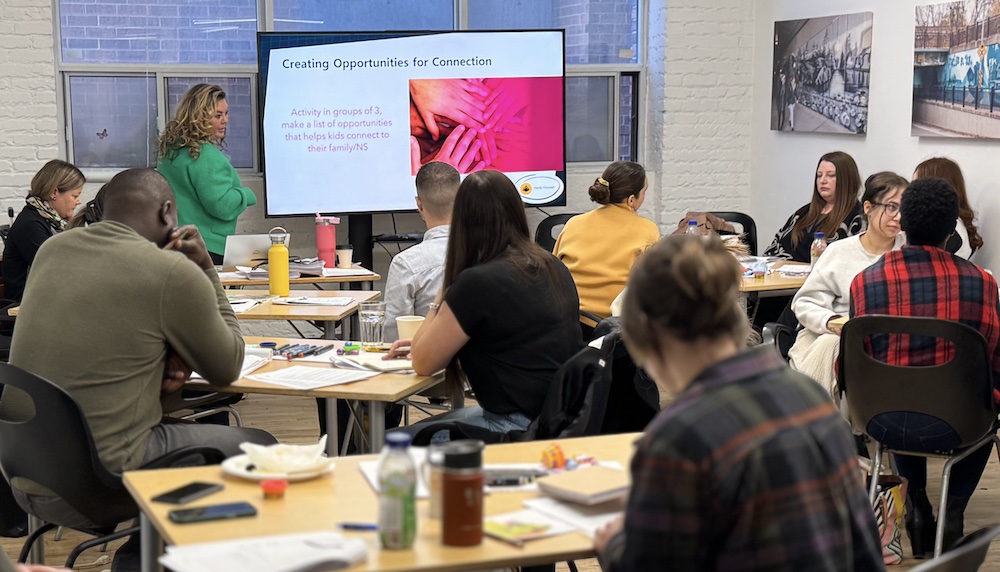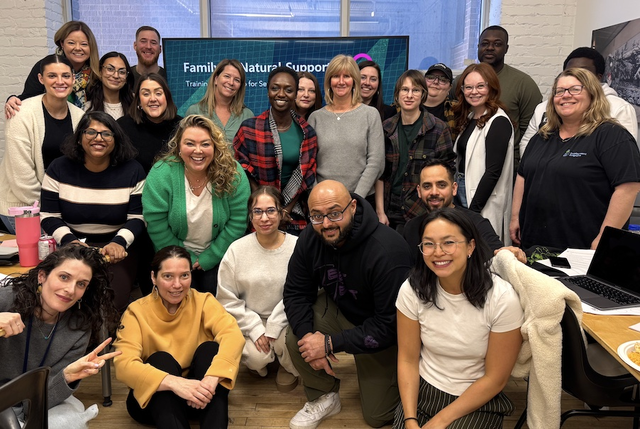I’m thrilled to share news of the $3.7m in funding we’ve received from Employment and Social Development Canada’s Youth Employment and Skills Strategy program. This funding will help us to integrate the Family and Natural Supports (FNS) intervention into the employment programs of eight youth-serving agencies across the country. This means that employment workers better integrate FNS into their practices, and ultimately, better employment opportunities for youth.
You may be wondering why focus on employment? Our Without a Home study revealed that over 50% of homeless youth are unemployed, compared to only 12-14% of their peers in the general youth demographic. Additionally, more than 53% of these youth have had to leave school early without completing their education.
Homeless youth often lack essential resources, such as income, personal safety, food, qualifications, a stable and structured daily routine, and supportive adults, that enable most people to work or pursue education. Compounding these difficulties, many face additional challenges related to discrimination, mental health issues, disabilities, or substance use disorders. Unfortunately, traditional employment training programs often fall short; the same factors that hinder youth’s ability to find and keep a job are also obstacles to succeeding within training programs.
This 14-month project, in partnership with the Canadian Observatory on Homelessness, ultimately aims to enhance young people’s access to vital support systems. By fostering lasting relationships with family and natural supports, such as a parent, an aunt or uncle, grandparent, Elder, coach, or other meaningful adults in their lives, we’re not only creating a pathway to stability for youth, but also helping them thrive into adulthood.

Heidi Walter (Program Design and Training Consultant) leads a hands-on activity during the two-day FNS training in Toronto with participants from all eight sites.
The Role of FNS in Preventing Youth Homelessness
Family conflict is the primary contributor to youth homelessness.
Alongside our community partners, we developed the FNS approach to help young people who are homeless or at risk of becoming homeless strengthen their relationships with family and other meaningful adults. The FNS approach views family relationships as crucial to preventing youth homelessness. It emphasizes that every young person should have at least one caring adult who truly values and supports them.
The concept of “family” can differ based on personal experiences, like being raised by grandparents, as well as cultural contexts, and should be defined by the youth themselves. Additionally, the individuals a young person wants to connect with may include their parents but could also encompass other relatives or trusted adults in their community.
FNS helps youth and their families in creating a solid foundation for housing stability, employment, well-being, and a secure transition into adulthood.

Team members from A Way Home Canada’s Training and Technical Assistance team, along with the Canadian Observatory on Homelessness Research team and participants from all eight FNS sites, are gathered for a photo following the two-day FNS training in Toronto, ON.
About the Project
This project is all about empowering employment workers so they can provide even better support to our youth. We’re excited to be collaborating with these eight organizations to seamlessly integrate FNS into their employment practices:
- 360°kids (Richmond Hill, ON)
- CMHA Kelowna (Kelowna, BC)
- Choices for Youth (St. John’s, NL)
- Dans la rue (Montreal, QC)
- Stepstones for Youth (Toronto, ON)
- Trellis Society (Calgary, AB)
- Wyndham House (Guelph, ON)
- Youth Services Bureau of Ottawa (Ottawa, ON)
We aim to engage 152 youth in this project and include 100 family members or other significant adults in their lives. Our goal is for 70% of youth participants to come from equity-deserving communities, highlighting our commitment to supporting underrepresented groups. This is essential for ensuring our services reach those who need them most.
Since 2017, our Making the Shift Youth Homelessness Demonstration Lab has implemented FNS at 15 sites across Canada. Our learnings have allowed us to strengthen the program and practice model and build evidence around the value and universal application of the FNS approach.
Thanks to this new funding, the insights we gather will help us enhance the FNS framework, allowing us to support even more youth in meaningful ways. Here are some of the key measures of success for FNS:
- Improved relations between young people and their families, where all involved develop skills including communication, mediation, anger management, impulse control, and more.
- Youth are able to stay in place and remain connected to their community.
- Attachment to schools and education is nurtured, leading to lifelong benefits, including better access to employment.
- Youth gain skills, tools, and information that support employment.
By addressing the essential needs of these youth and strengthening family and community support, FNS serves as an important link for establishing connections to education, training, and employment. This holistic approach not only enhances immediate support systems but also leads to better life outcomes, helping youth reach their full potential.
To Learn More:
Contact Heidi Walter, Program Design and Training Consultant, hwalter@awayhome.ca
Stay tuned for further updates on this project and for additional tools and resources to come.

This project is funded in part by the Government of Canada’s Youth Employment and Skills Strategy.
The opinions and interpretations in this publication are those of the author and do not necessarily reflect those of the Government of Canada.


